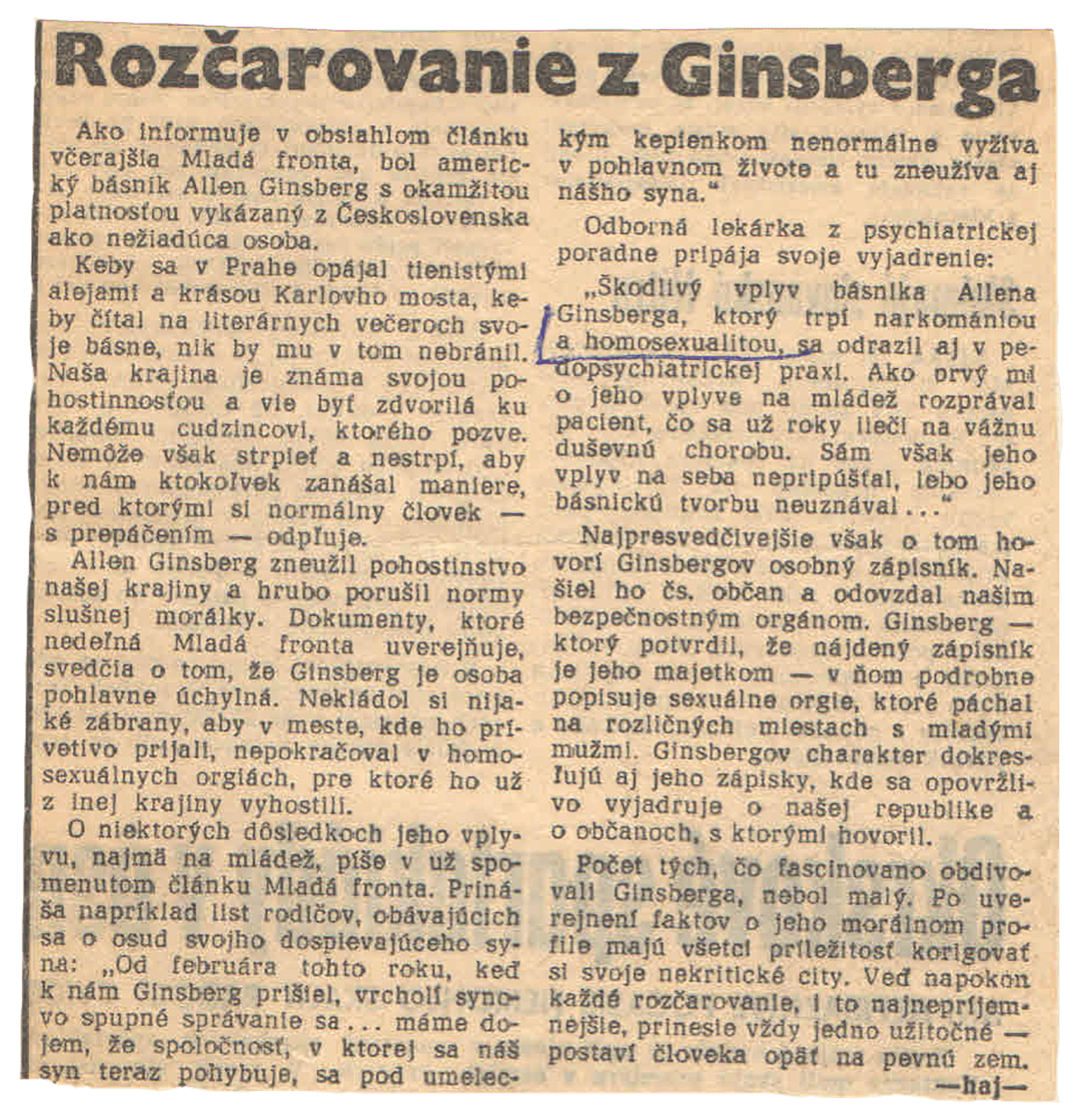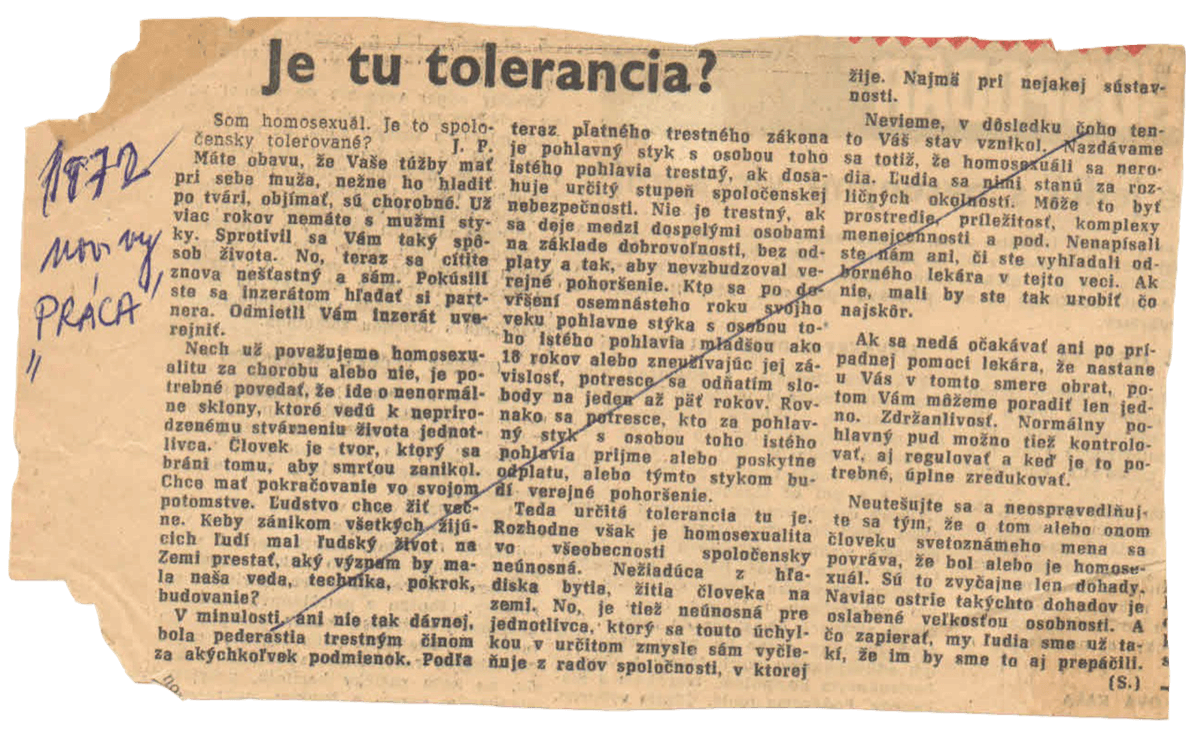Periodical articles in the official media often copied the view of homosexuality of that time. Whether we look at newspapers from the interwar period, or at the socialist press, we find mainly articles about "perverted" or "sick" people, criminal cases or scandals. Even after homosexuality was decriminalised, it took a long time for educational articles, such as the Czechoslovak article "They Live Among Us" (1973) to appear. This article was an exception in this respect. Most articles at that time depicted USA and the West as a "gay world."
Based on media articles, we learn very little about specific people, their needs, desires or positive examples from their own point of view. We do not hear about their efforts to change the unfair conditions they encountered. The first articles discussing this would only appear in the nineties.
They live among us
When, some time ago (MS no. 28/1972) I replied to a question regarding homosexuality, I would not think that the short text would provoke such interest. However, I could figure that according to common estimates, four out of a hundred person – be it men or women – are the so-called true (or constitutional) homosexuals. And if not only these, but also occasional, temporary homosexuals and the persons „of both ways“ are factored in, this means that there is a significant number of people amongst us who ask themselves questions regarding homosexuality and are looking for answers. What is more, they even feel burdened by their fate. In this text, I would like to attempt to react to the letters of those who have written to MS and address their most frequent questions. In addition, it will certainly not hurt others who are not directly affected by the topic to read the text as well. This is because homosexuals, no matter their percentage in the population, are, after all, forced to live permanently as a certain minority amongst other people. For their life to be possible and, actually, for both groups – homosexuals and the others – to be able to coexist without difficulties and conflicts, it is crucial for every person to be informed about the issue at least to some extent. That said, I would like to emphasise that it is not possible to answer all questions, Neither medicine, namely psychiatric sexology, a specialised peripheral discipline that primarily focuses on this issue, nor other sciences dealing with this problem have been able to provide correct answers to all questions so far.
Several opinions that I am going to mention here are thus open to discussion, although, naturally, I am attempting to present primarily those which have been agreed upon by the largest portion of professionals. One of the topics in which agreement has been reached is the issue of whether homosexuality is a disease. Homosexuality, i.e. the sexual orientation on persons of the same sex – cannot be considered a disease. Professionals have even agreed upon the fact that this is not a vice or a bad habit either. I would not like to dive too deep into the past; however, it should be said that homosexuality has been known from the time immemorial (homosexual behaviour can also be observed in animals) and the stance of society toward it has varied throughout time. In some societies, it was tolerated, even preferred (parts of the Antiquity, some Oriental societies); at times, it was harshly punished. The modern stance, which is prevalent and gradually establishes itself all over the world, has been forming and gaining ground after a long and arduous effort of some doctors, mainly psychiatrists and sexologists, but also sociologists and lawyers. It is based on the knowledge that it is a “peculiar feature exhibited by persons who are otherwise completely normal” or “a variant of sexual behaviour”, i.e. not a disease.
Another argument for viewing homosexuality as a certain variant of sexual behaviour is the fact that the majority of homosexual persons can hardly imagine being different than they are and have no desire to get rid of their difference, being at peace with their [fate]. They only strive to live just like the rest of people in society with their variant, which they have not chosen nor caused, but which simply “happened” to them. This is because their inner conflicts that cause neuroticism or anti-social behaviour are not a necessary accompanying effect of homosexuality; quite the contrary: they are caused by the fact that homosexual persons are often treated as if they were outcasts of sorts.
This type of prejudice is even fostered by many well-educated people who should in fact be better informed. They only encounter homosexuality when it is connected to negative phenomena such as neurosis, criminal acts etc. This subsequently skews the opinions of numerous criminal investigators, lawyers, and doctors. Therefore, the acceptance of a modern approach to this issue has taken so long. However, in our society, at least in the legal sphere, a more reasonable approach has won and according to our penal code, homosexuality is not a criminal offence. The only offence is such homosexual activity that harms minors under the age of eighteen or that which is related to prostitution or jeopardizing public morality. Otherwise, our law in this regard fully respects the freedom of our citizens and if there are any homosexual contacts between two adults without any financial compensation and in reasonable privacy, it is nobody’s business. This major advance in legislation is, however, not always accompanied by a change of social perception, which is why we often see conflicts and also why homosexuals often visit sexologists and psychiatrists. The public subconsciously holds certain prejudices which cause unfounded rejection of homosexual persons. This leads to statements that homosexuals “corrupt” minors. However, serious researchers note that adult homosexuals are attracted to minors protected by law, i.e. under the age of eighteen, just as often as this happens amongst adult heterosexuals. And the latter, if they cannot control themselves and molest persons under the age of fifteen, despite these persons’ consent, are, too, prosecuted according to the penal code.
I am going into details because of questions that were headed in this direction, but also because this shows that such prejudice is not legitimate. In heterosexual persons, nobody is usually interested about their doings in their intimate sphere, and the same intimacy should be enjoyed by homosexuals. We should abide by the popular saying “when two people love each other, their sex is not important”. One needs to realise that homosexual eroticism is not only about physical relations, but also about love, attraction, jealousy etc. just like in the rest of the population. In fact, the society should strive to get rid of prejudice against homosexuals and not push them into dead-ended situations, instead judging them by their personal qualities: according to how skilled they are professionally, what is their personality, how they fulfil given tasks, how they act in everyday life – simply put, to judge them just as everyone else is judged, instead of ignoring their positive traits because of their sexual variant. When advocating for this opinion, I often see objections that homosexuals are favoured.
.png)
Many people think that justice for homosexuals means preferring them and excusing them. From what has been said, it should be clear that homosexuality needs no excuse, just like it is not necessary in the case of heterosexuality. Sexuality is natural. Although in homosexuals, it does not contribute to the propagation of human population, but in this respect, this can be seen as a problem in the same light as involuntary infertility in heterosexuals. It would not even occur to anyone to limit their sexual activity because of their infertility. This is why homosexuals – and I repeat, if they abide by the laws, which also have to be respected by heterosexuals anyway – cannot be denied sexual activity and be discriminated against because of it.
Similarly, they cannot be preferred. At a time when homosexuals needed to defend themselves against persecution, they often presented famous names of persons of science and culture, suggesting that this variant may be connected with geniality. I think that this frequently discussed circumstance only serves as another argument in favour of judging people according to their activity in their field, according to their social contribution and their character, and not solely according to their sexuality. In the end, if listing homosexual storytellers, writers, musicians or sculptors, we can find similarly prolific and successful heterosexual counterparts without any hesitation. And ultimately, the laws of statistics would lead us to the conclusion that even amongst geniuses, the ratio of homosexuals and heterosexuals is the same as that of the general population. This is why we also reject various opinions stating that homosexuality is some kind of a higher stage of interpersonal relationships, a higher form of friendship, a prerequisite to the development of artistic skills and so on and so forth, as we often hear some homosexuals say and as we can read in various Western publications and magazines. Just like heterosexual persons appreciate a good heterosexual relationship with all of its related benefits, homosexuals, too, can appreciate their own relationships and subjectively see them as completely satisfying etc. However, creating a certain legendary exclusivity and superiority makes no sense and only creates repeated conflicts between the majority and the minority of society – this time, however, caused by the behaviour of the minority. The majority of homosexual persons is well aware of their difference and even though they may not want to get rid of it, they still ask whether homosexuality can be cured. Before attempting to answer this quarrion, let us try and state the reasons why homosexuality should even be cured when it is a congenital variation and not a disease. One could say that, for example, congenital deafness is also not a disease, just like other organic defect arising from a developmental disorder.
Even in these cases of homosexuality, a doctor may be of significant help. Various forms of psychotherapy help those who are afflicted and come primarily because of problems with integrating into society. The psychiatrist is able to help in the resocialisation of personality, helping the afflicted find their place in the world and establish conflict-free relationships between them and their surroundings, be it in their family, at work or another social group. This is why medical care is usually fully reasonable, although its aim is not to “cure homosexuality”.
I hope that the information in this article will, too, help the establishment of such conflict-free relationships, and that it will be read not only by those who wrote to MS with their problems, but also those who are in a vast majority. Among this majority, however, lives the minority in question and only the relationships between these groups will be the deciding factor in how one who has not chosen one’s fate will be able to carry on and live.
MUDr. PAVEL ZEMEK



